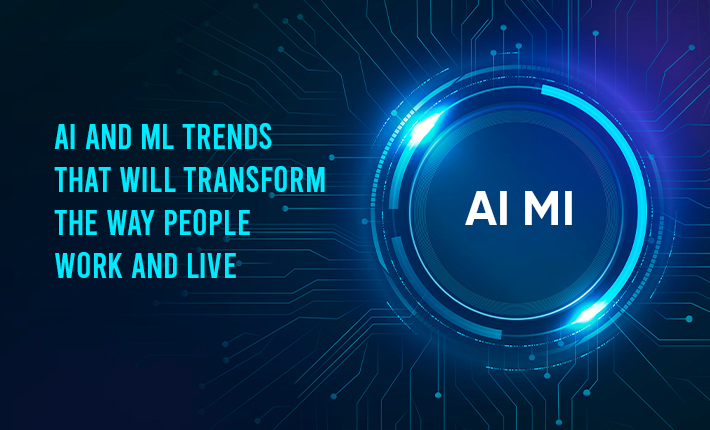Artificial Intelligence (AI) and Machine Learning (ML) have already started to revolutionize the way people work and live, and the next decade will witness even more transformative advancements. Here are some AI and ML trends that will reshape various aspects of our lives:
1) Intelligent Automation: AI and ML technologies will increasingly automate repetitive and mundane tasks across industries. Robotic Process Automation (RPA) combined with AI capabilities will streamline workflows, freeing up human workers to focus on more complex and creative tasks. This trend will enhance productivity, efficiency, and accuracy in various domains, ranging from manufacturing and logistics to customer service and administrative tasks.
2) Personalized Experiences: AI and ML algorithms are becoming more adept at analyzing vast amounts of data to understand individual preferences, behavior, and needs. This trend will lead to highly personalized experiences in areas such as entertainment, e-commerce, healthcare, and education. Personalized recommendations, tailored content, and adaptive learning platforms will provide individuals with customized experiences that cater to their specific requirements.
3) AI in Healthcare: The healthcare industry stands to benefit greatly from AI and ML technologies. AI-powered diagnostic systems can assist healthcare professionals in analyzing medical images, identifying patterns, and making accurate diagnoses. AI algorithms can also help predict disease outcomes and recommend personalized treatment plans. Additionally, wearable devices and health monitoring systems powered by AI will enable proactive and personalized healthcare management.
4) Enhanced Customer Service: AI-powered chatbots and virtual assistants are becoming increasingly sophisticated in understanding and responding to customer queries and requests. Natural Language Processing (NLP) and sentiment analysis capabilities enable these systems to provide more accurate and context-aware responses. As AI algorithms continue to improve, customer service interactions will become more seamless, efficient, and personalized.
5) Smart Homes and IoT: The Internet of Things (IoT) combined with AI and ML technologies will transform homes into smart, interconnected environments. AI-powered voice assistants and smart devices will enable homeowners to control various aspects of their homes, from temperature and lighting to security and entertainment, using natural language commands. These advancements will enhance convenience, energy efficiency, and overall quality of life.
6) Autonomous Vehicles: AI and ML are key enablers of autonomous vehicles, with the potential to revolutionize transportation. Advanced driver-assistance systems (ADAS) powered by AI are already improving road safety by detecting and responding to potential hazards. In the coming years, fully autonomous vehicles will become more prevalent, transforming transportation systems, reducing traffic congestion, and enhancing overall transportation efficiency.
7) Predictive Analytics and Decision-Making: ML algorithms are increasingly being used for predictive analytics, helping businesses and organizations make data-driven decisions. By analyzing historical data, patterns, and trends, ML algorithms can provide insights and forecasts, enabling proactive decision-making across various industries such as finance, marketing, and supply chain management. This trend will lead to more informed and effective decision-making processes.
8) AI in Education: AI and ML technologies have the potential to revolutionize education by providing personalized learning experiences, adaptive assessments, and intelligent tutoring systems. AI-powered platforms can analyze student performance data, identify knowledge gaps, and tailor educational content accordingly. This personalized approach to education will enhance engagement, learning outcomes, and educational accessibility.
In conclusion, AI and ML will continue to transform the way people work and live. These technologies will automate repetitive tasks, provide personalized experiences, revolutionize healthcare, enhance customer service, create smart homes, enable autonomous vehicles, facilitate predictive analytics, and revolutionize education. As AI and ML continue to advance, it is crucial to ensure ethical and responsible deployment, addressing concerns such as privacy, bias, and accountability. By embracing these technologies, we can unlock new opportunities for innovation, productivity, and improved quality of life.














Post Comments